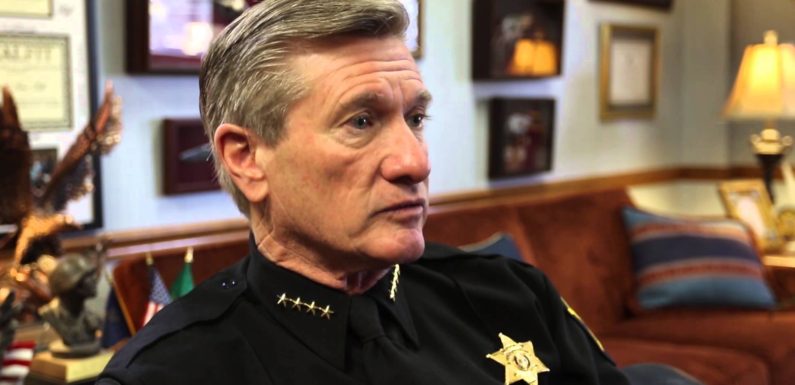
By Sheriff Leon Lott
Change is a part of growth. And as we approach a new year in an age when societal changes are far greater and more rapid than they have ever been, I am keenly aware of the necessity of embracing change in the way we – as law enforcement leaders – lead our departments; and, in many ways, lead our communities.
Leaders today in both law enforcement and the military – which, by the way, closely parallel the leader dynamics we experience in modern law enforcement and vice versa – must not only be willing to change; but to an increasingly greater degree be agents of change.
Gone are the days when a large-agency sheriff or police chief simply enforced the given laws of his or her jurisdiction by simply overseeing the deputies and other sworn officers in his or her charge. That responsibility remains to be sure. But there are new, frankly far-more complex dynamics in the mix requiring the law-enforcement leader to be out-of-the-office; spending much more time in the field; talking; listening; developing training and being trained in new technologies, tactics, techniques and procedures; working with media in all of its 21st-century methodologies and forms; and readjusting his or her mindset to that of the young patrol officer who, in many ways, processes information differently than that of his predecessor.
This readjustment on the part of the modern leader is critical.
Many – perhaps most – law-enforcement leaders of large police departments and sheriff’s offices are of the “baby boom” generation; whereas a large and growing percentage of their police officers and deputies are of the “millennial” generation.
Granted, the values are the same among all generations of law-enforcement officers else they would not have taken the oath. But the baby-boomer law-enforcement leader must know how to relate to millennial officers. It’s no longer about the younger officer adapting to the older leader’s demands. Today, the older leader has to adapt to the younger officer’s way of thinking.
This is not to suggest that firmness and authority are to be dismissed. But it speaks to the fact, that millennials are clearly different. They ask questions. They are a bright, inquisitive bunch who grew up in a world of high-speed computer-technology, 24/7 worldwide media, and instant, always accessible communication with virtually anyone. They want to know exactly how things work, why we do things the way we do, and – perhaps more importantly – what is it about the way we do things that make that way better than another way.
The law-enforcement leader has a responsibility to these young officers and their inquisitive nature.
Law-enforcement officers often don’t like to use this word, but you have to “love” your people. Love in the sense of an action. It’s a verb, not necessarily a noun implying affection (though that too). But you truly have to care about your people. You have to trust them. Believe in them. Share your responsibility with them. Don’t micromanage them.
I train and equip all of my subordinates to make sound decisions and then I let them make decisions based on what I have taught them. But they don’t exist in a vacuum. They are not alone. And the modern law-enforcement leader has to articulate this to his or her officers.
If, for instance, one of my deputies is hurting, if they are suffering, if they are dealing with a personal or professional challenge or otherwise going through a difficult time; I have to be there for and protect them. I am. I do. And they know that.
Beyond that, the leader of any law enforcement agency – but especially a large agency – must realize and accept that he or she is not going to make everyone happy. Leaders have to make the hard calls. And sometimes that call is a less-than-pleasant experience for someone else.
Then there is leadership in the all-important realm of public and community relations. Public relations, community needs, and the public’s access to the law-enforcement leader are infinitely more important today than they have ever been.
Not that public relations were ever less important. But today, the law-enforcement leader’s direct interaction with the public is not only expected, but clearly understood by all to be a direct benefit to both the community served (in terms of building lasting trust and friendships) and to the law-enforcement leader (in terms of preparing his or her officers to better appreciate and understand the very real needs within the communities they are sworn to serve and protect).
Also, different communities necessitate different approaches to bridge-building. This reality wasn’t always embraced. It must be today.
What are some of the other particulars of the aforementioned changes in law enforcement operations that we have been talking about here and that the leader must embrace going into 2018?
Two of the biggest are LIVE PD and social media.
LIVE PD, real-time nationally televised policing and police interaction with suspects and the community, is not only going to continue; it is the future. And the hit TV series’ enormous popularity speaks to the truth of that future.
Social media: It too is here to stay, and it is only going to expand. Everyone has a voice and, yes, a camera.
As a consequence of both LIVE PD and the evolution of social media; police officers and deputies must never fail to demonstrate compassion, care, fairness, and proficiency in their work; attributes which I have always demanded from my deputies. Police officers and deputies must also be smarter, safer, and far-more professionally capable than ever before. These things are the law-enforcement leader’s responsibilities, and they are – and I believe have always been – huge responsibilities.
Fortunately for us here within the Richland County Sheriff’s Dept. – one of six agencies regularly featured under the potentially unforgiving microscope of LIVE PD as well as cell-phone cameras and social media – we long-ago developed a culture of building good leaders. Today we are benefiting from that long-established culture. But we will not grow too comfortable in that good-leader dynamic. Why? Because it always has to change, evolve, and re-adapt to all variables seen and unseen in order to survive going forward. As long as I am sheriff, we will.
– Sheriff Leon Lott leads the Richland County Sheriff’s Dept., one of the largest law enforcement agencies in South Carolina, and one of six regularly featured LE agencies on A&E’s hit TV series, LIVE PD. In 2010, Lott traveled to Erbil, Iraq – at the invitation of the Iraqi government – to assist in the establishment of, planning for, and training at the first-ever Iraqi female police academy.

